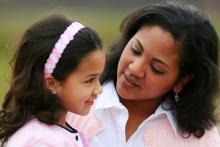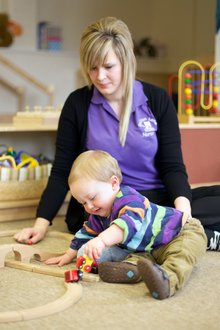This article was written by Rebecca Elsom, Early Years Development Officer at the Early Years Alliance.
For children to be able to speak clearly, they need to have a strong foundation of other skills in place first. They need to be able to listen well, understand words, and say words in sentences. Having clear speech is the final piece of the puzzle!
Developing speech sounds
To create all of the different speech sounds that we need to create understandable words, we are required to move our mouths, lips, tongue and faces in a variety of ways. It may surprise you that there are some speech sounds that children don’t always develop fully until much later, often up until 5 or 6 years old. Sounds such as ‘r’ or ‘th’ are much harder to say due to the shape our mouths need to make and the way our tongue needs to move to create these sounds.
Some children may be able to make the individual speech sounds but may find it tricky when trying to put these sounds together to create words and sentences. When children are having difficulty with creating certain speech sounds, their speech may be unclear and difficult for others to understand.
You may find that you, and other close family or friends, are able to understand what your child is saying, yet others find it much harder. This is understandable when you are with your child more regularly than they are and you have begun to learn what they are trying to say.
So, what can do to help?
-
Model good examples of language – you may feel like you need to correct your child’s pronunciation of words, however we don’t want them to feel like they are getting things ‘wrong’, we want them to continue trying to say words and practising their sounds. What we can do is recognise their attempts to communicate with us and then say the words clearly for them to hear. For example, your child may say ‘look it’s a tat’, rather than you saying ‘no, you say cat, not tat’ you could try saying, ‘yes it is a cat, it’s a black and white cat’. Your child will feel heard and valued, as well as hearing how to say the word correctly for their future attempts.
-
Support other forms of communication – it may become quite frustrating for your child when others do not understand them, but we can support them to use other ways to communicate; this might be pointing, actions, or using photos and images to let others know what they are wanting or trying to say.
-
Develop their ‘fine motor skills’ – as we have already outlined, making speech sounds requires us to use all of the different muscles around and within our mouths. You can support your child to use these different muscles with activities such as blowing bubbles, pulling faces or sticking out their tongues!
-
Have fun with sounds – We want children to enjoy practising their sounds! Can you ‘buzzzz’ like a bee, or ‘hisssss’ like a snake? Perhaps you create a nonsense song or rhyme together that allows you to use lots of different sounds.
If you have concerns about your child’s speech, please do not hesitate to seek further support from other professionals such as someone at their early education setting, a health visitor or a speech and language therapist.
Other useful websites to support with speech and language:







